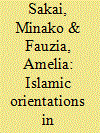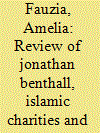|
|
|
Sort Order |
|
|
|
Items / Page
|
|
|
|
|
|
|
| Srl | Item |
| 1 |
ID:
127648


|
|
|
|
|
| Publication |
2014.
|
| Summary/Abstract |
Indonesia has approximately 240 million people, and more than 85% of the population are Muslims. Whilst incidents of religious intolerance have frequently been reported in the mass media, political Islam in Indonesia, represented by Islamic political parties, seems to have failed to gain popular support. Against this conflicting standing of Islam and Islamic organizations in Indonesia, this study focuses on Muslim religiosity and perceptions of the role of Islam in contemporary Indonesia. Based on our survey of 1500 Muslims in Indonesia in 2010, and case studies in regional Indonesia, this paper shows that, due to sociocultural change in regional Indonesia, and the diffusion of religious authority through media use, Indonesian Muslims are becoming less political Islamists, and more sociocultural Islamists who are attempting to advocate Islamic morality. This trend is in line with scholarly observations of post-Islamism prevalent in other parts of the Muslim world.
|
|
|
|
|
|
|
|
|
|
|
|
|
|
|
|
| 2 |
ID:
157221


|
|
|
|
|
| Summary/Abstract |
This article discusses the nature of Islamic philanthropy and social services in the context of the plurality of Indonesian society by looking at the early development of Muhammadiyah’s charitable activities, known as Penolong Kesengsaraan Umum or by the acronym PKU (Assistance for the Relief of Public Suffering). This article asserts that PKU took an inclusive approach to humanitarian issues in providing social services to underprivileged groups and that this was claimed as being ‘without discrimination of religion and race or group.’ It analyses the ‘bridging’ and ‘bonding’ aspects of faith-based philanthropy as social capital and questions how it was that PKU could formulate inclusive ideas that underpin its vision and activities and that bolster Muhammadiyah’s label as a civil society organisation. Even though the ideas were overtaken at the end of the Dutch colonial period, the potential for an inclusive principle remained in place.
|
|
|
|
|
|
|
|
|
|
|
|
|
|
|
|
| 3 |
ID:
152537


|
|
|
|
|
| Summary/Abstract |
Do charities flourish more in troubled times than in good times? The story of The Good Samaritan may be the first, and perhaps the best-remembered, illustration for those who agree that this is, in fact, the case. In responding to misery and hardships, human affection grows and humanitarian activities increase to ensure that assistance for the needy is moved through many channels. This phenomenon has been observed throughout history, including in Muslim societies and Islamic charities. However, the so-called ‘War on Terror’ (especially with its unjustified blacklisting of certain charities) has been a major source of problems for the existence of Islamic charities as well as for Muslim religiosity and identity. The current political crises in the Middle East have produced not only floods of migrants who flow out of countries in conflict zones, such as Syria, but also flows of charitable aid that arise in response to appeals and are delivered in response to these troubles. Islamic charities are thus put in a delicate position as a consequence of the suspicions that are directed towards them. In such cases and in such times, how do Muslims, Muslim communities, and Islamic charities respond to troubling events that are taking place in Muslim-majority countries and beyond? Do they respond and develop differently from Western and other faith-based charities?
|
|
|
|
|
|
|
|
|
|
|
|
|
|
|
|
|
|
|
|
|